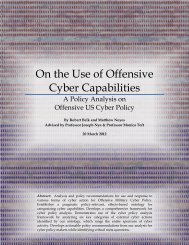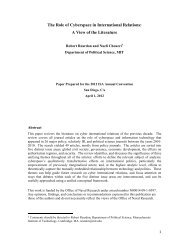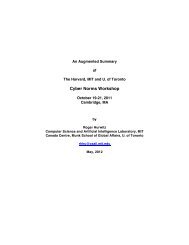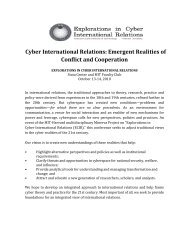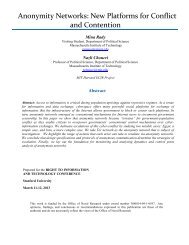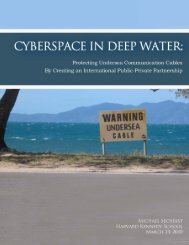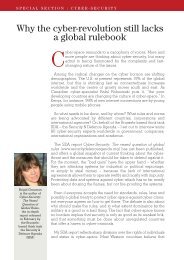Stewardship of Cyberspace: Duties for Internet Service Providers
Stewardship of Cyberspace: Duties for Internet Service Providers
Stewardship of Cyberspace: Duties for Internet Service Providers
Create successful ePaper yourself
Turn your PDF publications into a flip-book with our unique Google optimized e-Paper software.
HATHAWAY/SAVAGE: <strong>Stewardship</strong> <strong>of</strong> <strong>Cyberspace</strong>: <strong>Duties</strong> <strong>for</strong> <strong>Internet</strong> <strong>Service</strong> <strong>Providers</strong> 13<br />
Cisco, ADP, and many others. The organization’s<br />
purpose is to educate and there<strong>for</strong>e empower<br />
a digital society to use the <strong>Internet</strong> safely and<br />
securely at home, work, and school, protecting<br />
the technology that individuals use, the net-<br />
works they connect to, and shared digital assets.<br />
It develops and disseminates educational materi-<br />
als <strong>for</strong> home, classroom, and business use.<br />
Australia commissioned a study to understand<br />
the depth <strong>of</strong> education initiatives around the<br />
world. The research report by Galexia docu-<br />
ments more than sixty-eight different initiatives<br />
and highlights the different techniques used<br />
to educate consumers on the basics <strong>of</strong> cyber<br />
security. 42 The study notes that many <strong>of</strong> these<br />
initiatives help fight illegal and harmful online<br />
content and conduct while at the same time<br />
promoting the safer use <strong>of</strong> both the <strong>Internet</strong> and<br />
other communication technologies.<br />
Other innovative activities include the fielding <strong>of</strong><br />
video games to educate the public. In the United<br />
States there is a partnership between i-SAFE<br />
(a non-pr<strong>of</strong>it organization dedicated to educat-<br />
ing and empowering youth (and others) and<br />
Carnegie Mellon University to safely, respon-<br />
sibly, and productively use In<strong>for</strong>mation and<br />
Communications Technologies (ICT). They are<br />
integrating an on-line game called “MySecure-<br />
<strong>Cyberspace</strong>” into thousands <strong>of</strong> K-12 programs<br />
across the United States. 43 Children play the<br />
game in a digital “city” and learn to secure key<br />
infrastructures and critical services. Children<br />
become aware <strong>of</strong> online security and privacy<br />
42 An Overview <strong>of</strong> International Cybersecurity Awareness and<br />
Educational Initiatives: A Research Report, Australian Communications<br />
and Media Authority, May 2011. http://www.acma.gov.<br />
au/webwr/_assets/main/lib310665/galexia_report-overview_intnl_cybersecurity_awareness.pdf<br />
43 “Cyber Education,” Carnegie Mellon University, http://www.<br />
carnegiemellontoday.com/pdfs/news_pdfs/CMSecurity_Cyber-<br />
Education.pdf and the game is accessible on the web at www.<br />
mysecurecyberspace.com.<br />
issues as they interact with the game’s Carnegie<br />
Cadet characters in a virtual world. Similarly,<br />
the United Kingdom has launched an on-line<br />
virtual reality game entitled “Smokescreen” that<br />
guides teenagers through the dangers <strong>of</strong> social<br />
networking. 44 The game has over thirteen “mis-<br />
sions” that place teenagers in situations that<br />
<strong>for</strong>ce them to ask themselves “what would I do<br />
if it happened to me?” What if ISPs promoted<br />
innovative educational materials like these? In a<br />
secondary educational campaign, the Ministry<br />
<strong>of</strong> Defense aired a number <strong>of</strong> television commer-<br />
cials alerting citizens <strong>of</strong> their responsibility <strong>for</strong><br />
on-line security. The commercials present sce-<br />
narios in which criminals, terrorists, and preda-<br />
tors review personally posted data on YouTube,<br />
Twitter, Facebook, etc., to achieve their nefari-<br />
ous purposes. 45<br />
The cyber-security problem space is growing<br />
faster than the solution space. If ISPs undertake<br />
the duty to educate their customers about the<br />
threats, then our respective government leaders<br />
will be able to engage in a broader conversation<br />
about all <strong>of</strong> the solutions that can be brought to<br />
bear to address the problem comprehensively.<br />
6. Duty to in<strong>for</strong>m customers <strong>of</strong> apparent<br />
infections in their infrastructures<br />
Media headlines throughout the past year have<br />
been rife with high-pr<strong>of</strong>ile cybercrime events,<br />
confirming that insecure computers are being<br />
infected every day. Criminals have shown that<br />
they can harness bits and bytes with precision<br />
44 The game is accessible on the web at http://www.smokescreengame.com/<br />
and “Smokescreen —A New Resource <strong>for</strong> Promoting<br />
Saftey Online.” https://blogs.glowscotland.org.uk/glowblogs/<br />
ISRU-News/2010/05/06/smokescreen/.<br />
45 United Kingdom, Ministry <strong>of</strong> Defense Online Security Campaign.<br />
See “Personal Security Online” videos on YouTube at<br />
http://www.youtube.com/watch?v=hpKiIrYDLxg; http://www.<br />
youtube.com/watch?v=-UziYBdnQhk; http://www.youtube.<br />
com/watch?v=1UyWN0uREfk; and http://www.youtube.com/<br />
watch?v=qXZSzs-P2kQ.



